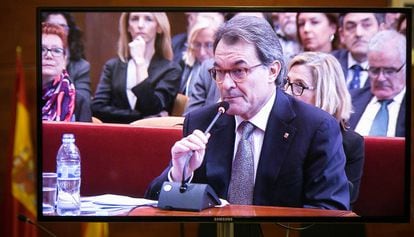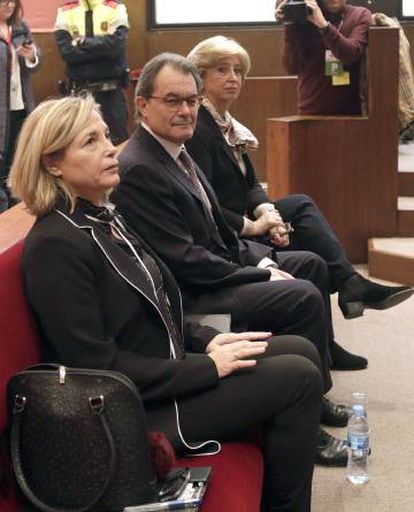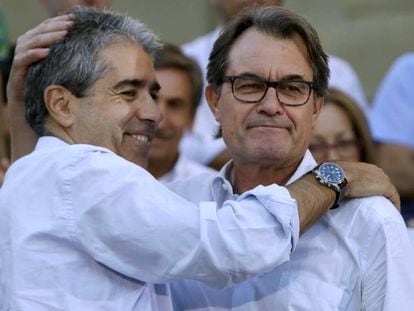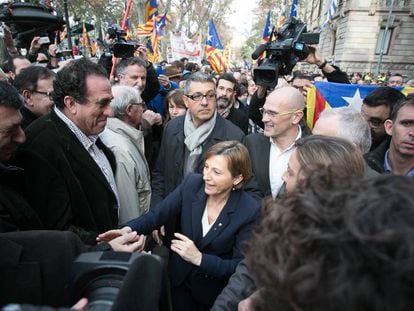Thousands march in Barcelona as trial over Catalan independence vote begins
Ex-premier Artur Mas and two top aides face lengthy bans from public office if found guilty
The former premier of Catalonia and two top aides went on trial on Monday over an informal independence vote for the region held on November 9, 2014. Artur Mas faces a 10-year ban from public service for disobedience and for deliberately making unlawful decisions while holding office. His ex-deputy premier Joana Ortega and ex-education chief Irene Rigau could each receive nine-year bans.

The five-day trial is widely viewed as a showdown between Catalan separatists and the central government in Madrid, which is in the hands of the conservative Popular Party (PP). Current Catalan premier Carles Puigdemont said that the case “should never have reached the courts.”
Pro-sovereignty groups used the hearing to make a public show of force. In the minutes prior to the scheduled starting time, thousands of supporters marched with the defendants along downtown Barcelona, waving unofficial independence flags and holding up signs reading “We shall overcome.”
No will to disobey
Inside the Catalan regional High Court, Artur Mas did not answer questions from the prosecution and instead said that the Constitutional Court should have done more to stop the vote “if it was so evidently a crime.”
“There was no express will to commit any crime or to disobey anybody,” said Mas, alleging that the Constitutional Court – which had banned the informal referendum four days before it took place – did not properly explain the legal consequences of holding the ballot. Both Ortega and Rigau followed the same line of defense.
We are holding our heads up high, we would do it all over again
Artur Mas, ex-Catalan premier
In court, Mas portrayed himself as a politician torn between “two duties”: the duty to obey the Constitutional Court’s ban, and “the higher duty” of obeying “the [Catalan] parliament’s mandate” and “the clamoring in the streets” demanding a vote on independence.
He also insisted that the non-binding poll was “not directly organized” by the regional government but rather by 42,000 volunteers, and that Catalan authorities simply offered “support.”
Prosecutors reject this theory and say they have evidence showing that the Catalan government actively worked to make the poll happen by opening voting stations, providing laptops and more.

Around 2.3 million people voted in the “participatory process” held on November 9, 2014 out of an eligible voter pool of 6.3 million, according to the regional government’s own figures. Although 80% voted in favor of independence, it was dismissed by international observers as lacking sufficient guarantees of objectivity, given that it was organized and counted by pro-sovereignty activists and that many detractors of independence simply did not participate.
The vote further eroded relations between Madrid and Catalonia, where separatists received a renewed mandate to push for independence at the regional election of September 27, 2015, won by the pro-sovereignty Junts pel Sí coalition.
The current Catalan government is promising to hold a binding referendum on independence later this year. Speaking in Malta on Friday, Spanish Prime Minister Mariano Rajoy insisted that any regional referendum on independence will be illegal as per the Spanish Constitution.
“We can talk, but everyone must obey the law,” he said in Malta.
A distraction
On Monday, non-nationalist parties criticized the public display by separatist forces, portraying it as a distraction from political scandals in the region.
“I see Mas much more at ease talking about this trial than about the ‘3% case,’ [a reference to the commission allegedly paid to government officials in exchange for contracts], or about the ‘Palau case’ [involving alleged illegal party financing],” said Inés Arrimadas, head of the Catalan branch of the center-right party Ciudadanos.
Arrimadas was alluding to separatists’ hope that the show of force will reinforce unity within their camp following recent divisive scandals. One of these involves a judge who said the regional government has illegally accessed Catalan taxpayers’ files, and another has to do with new arrests in connection with a large bribes-for-contracts scheme affecting the nationalist party Convergència, which has since renamed itself as the Democratic Party of Catalonia (PDeCAT).
English version by Susana Urra.












































